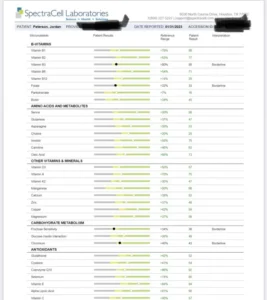Looking back on how I did my elimination diet, I can see a number of things I did wrong. This is a post describing how I would do an elimination diet now (pretty much what I’m doing now anyway).
This might seem extremely strict… and it is. Not much I can say about that except that it’s only a month, and you might be able to reintroduce most things back in right away. This is the diet that helped my dad, and I. I tried to do a less restrictive one with dad, but it wasn’t good enough.
I would do this if you are suffering from a number of the following symptoms:
– extreme fatigue (you nap every day)
– insomnia
– itchy skin
– skin problems (acne, rashes, etc)
– severe depression and/or anxiety – or other mental problems (OCD, schizophrenia, etc.)
– joint pain
– nerve pain
– muscle pain
– mouth ulcers
– bleeding gums
– digestive distress (stomach pain, bloating, constipation, diarrhea)
– GERD’s
– you’re overweight or you seem to gain weight easily and quickly in a bad way
– autoimmune disease/s
– you’re taking prescription medication long term (e.g. proton pump inhibitors)
– you’ve been prescribed antibiotics multiple times
– anything else I haven’t mentioned that really bothers you
or if you feel like you could feel better.
This beginning part will take you about a month to feel better. It took me 24 days. Keep on this strict diet for a month and then SLOWLY reintroduce foods to see how you feel (read more posts to see how to reintroduce foods).
What to be prepared for (warnings):
- you won’t eat out for at least month (you can’t cheat, and eating out takes practice when you’re restricted)
- if you’re not used to cooking, it’s going to be some work at the beginning but I have very simple recipes that take no time. (e.g. take chicken out of package, put in oven at 400 for 50 minutes, eat)
- your friends might think you’re weird
- people might be angry. (people are very attached to their foods. Even if someone else is changing their diet)
- buying meat and vegetables can seem more expensive but remember you’re not eating out
- you might (probably will) experience some withdrawal symptoms
- you might feel worse for the first 1-1.5 weeks (I didn’t, but some people do)
- some people who cut out dairy for even just a month end up becoming lactose intolerant. My strong belief is that dairy is terrible for you, and if you end up lactose intolerant, good, but that is something that might happen.
- If you suffer from anxiety and/or depression, and you reintroduce something that was giving you trouble, you might experience a significantly worse reaction than you have experienced before. By reaction, I mean a bout of brain fog and depression that is more intense than what you’ve been experiencing. I don’t know why this happens but it does sometimes. It did to me, my father and a couple of my friends. This is something to seriously think about. It’s avoidable, but it can be scary if you don’t realize what’s going on. These are IgG reactions and I’ll go into more detail about them later.
- If you mess up and eat something you’re not supposed to, you have to start again. You can’t do this for a week, and go out for a slice of pizza and then continue onto day 8 of the diet. After the slice of pizza you are at day 1 again.
- Chances are you will feel better by week 3. This is the best thing I’ve ever done. Cutting out foods was the best thing my family has done. If done properly, this can improve your life indescribably. I would recommend this to anyone but you have to be careful.
Step 1: If you can afford it, or even if you can’t really afford it, find a naturopath (or if you’re lucky a doctor) and do an IgG food sensitivity test. Try to get the one that tests for over 200 foods. This will set you back approx. 450$ in Canada but it’s worth it. This is most important for people with mental problems that they’re trying to control (but still important for everyone). This will save you a lot of pain and suffering down the road. I know it’s expensive but if you can do it, do it. Seriously. Skip your skepticism (unlike what I did), and do it. It’s also a test that is much more accurate when everything is still in your diet. That’s why it’s the first step.
Step 2: If you have your IgG results, avoid everything you score above 22 on. Some of them will show up as green and supposedly okay, but anything above 22 (I believe) is a no-no. Even if they’re on my list of okay foods, avoid them, everyone’s a bit different. I’d be surprised if they showed up on the foods that I’m okay with though. Most people with IgG responses have similar responses (showing that some foods aren’t good for anyone).
If you’re not going to do the IgG test (or if you have your results) get started on grocery shopping!
Step 3: Cooking – I’ll add some recipes tomorrow or tonight that are super easy. Literally so easy that someone who has never cooked couldn’t mess it up. They also take no time. They’ll be for 2 people (I would recommend cooking this much even if you’re alone so you don’t have to cook so often), or double them for 4 people. Always make more food than you think you need. If you’re used to snacking, this will help with the anxiety of feeling like you don’t have enough food. Here’s a sample menu for a week (coming soon – this weekend):
Step 4: Follow for a month. Do not cheat. Feel insanely improved by week 3-4.
Step 5: Very carefully start to reintroduce foods.





Awesome post. I personally get bloated with avocados cuz they contain polyols. Don’t forget about organ meat and bone broth which can supplement you with magnesium, potassium and many minerals especially since this is a keto type diet. They also help repair the gut lining.
Yeah I eat organ meat and bone broth as often as possible 🙂 I’ll remember to write those in! Thanks. So far avocados have been going well! I keep the portions fairly small
How is your tolerance for less carby dairy like cream, butter or ghee? I find myself being a bit lethargic from the lack of energy since my diet consists of lots of protein(mostly chicken), greens, and avocados and I’m quite thin. It seems easier to get my caloric intake higher by just shooting myself up with butter and cream based fats for energy. Are there any other ways to easily increase my fat intake without eating more avocados? I’m about a week into the elimination diet and I can already feel a lot of the muscular back/shoulder tension I had being reduced quickly. Thank you so much for the information sharing on your blog!
I don’t think I can handle ANY dairy. I can’t do lactose and casein free whey, and I definitely can’t do cream. I haven’t attempted ghee or butter because my response to dairy was so nasty… I eat a lot of coconut and olive oil (probably close to 4 tablespoons a day?) So that helps. I fry the meat in coconut oil and make it pretty oily. It’s tastier that way anyways. We’re going to try MCT oil with coffee soon and hopefully that’ll go well. Keep it up for now! The lethargy could be from the change in diet, the first couple of weeks can be kind of hard, it should go away though.
Hey Mikhaila thanks for all these posts, I’m wondering, your IgG test, do you have a link to the company you bought the test from? I’m from Sweden (and live here) and the tests that I’ve seen here does not have the same scale as you describe and I would like to really get that threshold clear whether its 6/10 or 22/? so that I do not make those kind of mistakes. Thank you in advance!
Greetings from Sweden
http://rmalab.com/medical-laboratory-tests/allergy/igg-sensitivity I’m going to write another IgG post to clarify why the testing isn’t a scam. This is the company I used though… I’m not sure if you’ll be able to use it in Sweden. Good luck!
Yeah most likely not, the company I’ve seen used in Sweden use another scaling system, I’ll learn by figuring out what foods that come into the green side of the scale that I react to by doing like you did, trial and error.
Do you still recommend an iGg test even if I do it after I’ve started the elimination diet? I really can’t afford it until next month and I really don’t want to wait.
Yes! IgG levels take a while to fall. Months.
Hey, I’m also from Sweden and starting to get a bit interested in this. Do you mind telling me what company you found in Sweden that do these tests? Did you try the test already? (writing in english to be polite)
Hey Mikhalia, just out of curiosity I’m interested in the diet but I’m a vegetarian. Would that be possible or would I have to reintroduce meat back into my diet? Many thanks.
Honestly, I don’t think being a vegetarian is good for you. If you’re concerned about the wellbeing of animals (completely valid concern), you can buy from people like Mennonites, or local butchers. You have to think of your wellbeing as well. If you are stuck on being a vegetarian, getting rid of dairy, soy, sugar, etc. should help, but as a dude you’re going to have to eat a lotttt. It’d be faster consuming meat. You could also just start with chicken. But like I said, if you really don’t want to switch, you can healthy up your vegetarian diet by cutting dairy, sugar, and soy.
The latter statement I’m doing already. Nonetheless thankyou.
Heeeey, I got reaaally interested in all of this stuff, but would you mind sharing any sources of info on why carbs/gluten is bad (I mean for those who are not really allergic to it)? Because it seems really hardcore cutting out all the carbs – people must have been eating things containing them for literally thousands of years, it should be as natural for our bodies as is meat-eating. Im not trying to mess around, just really interested in sciency part of this. Also, maybe you have some knowledge/experience on how this diet affects very physically active people? My main concern again is about carbs/energy – it seems that I would have to forget about all my working out goals (trying to gain weight and all) if I decide to hop on this diet.Thanks!
Leave a comment